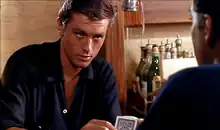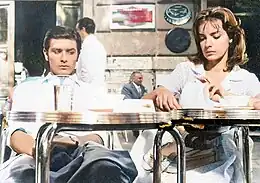Tom Ripley
Tom Ripley is a fictional character in the Ripley series of crime novels by American novelist Patricia Highsmith, as well as several film adaptations. He is a career criminal, con artist, and serial killer who always gets away with his crimes. The five novels in which he appears—The Talented Mr. Ripley, Ripley Under Ground, Ripley's Game, The Boy Who Followed Ripley, and Ripley Under Water—were published between 1955 and 1991. In every novel, he comes perilously close to getting caught or killed, but ultimately escapes danger.
| Tom Ripley | |
|---|---|
 Alain Delon as Ripley in Purple Noon | |
| First appearance | The Talented Mr. Ripley |
| Last appearance | Ripley Under Water |
| Created by | Patricia Highsmith |
| Portrayed by | Alain Delon Dennis Hopper Jonathan Kent Matt Damon John Malkovich Barry Pepper Ian Hart Andrew Scott |
| In-universe information | |
| Full name | Thomas Phelps Ripley |
| Alias | Dickie Greenleaf Derwatt |
| Gender | Male |
| Occupation | Con artist |
| Spouse | Heloise Plisson (wife) |
| Nationality | American |
Fictional background
Highsmith introduced Ripley in The Talented Mr. Ripley (1955) as a young man making a meagre living as a con artist. The novel also supplies him with a backstory: orphaned at age five when his parents drowned, he was raised in Boston by his Aunt Dottie, a cold, stingy woman who mocked him as a "sissy". As a teenager, he attempted unsuccessfully to run away from his aunt's home to New York City before finally moving there at age 20.
In The Talented Mr. Ripley, he is paid to go to Italy by Herbert Greenleaf, a shipbuilding magnate, to convince his son Dickie to return to New York and join the family business. Ripley befriends the younger Greenleaf and falls in love with the rich young man's indulgent, carefree lifestyle. He eventually murders Greenleaf and assumes his identity.
In Ripley Under Ground, set six years later, Ripley has settled down into a life of leisure and married Héloïse Plisson, an heiress who has suspicions about how he makes his money, but prefers not to know. Ripley has also become a silent partner in a gallery that markets counterfeit works by the artist Derwatt, who, unbeknownst to the public, has been dead for several years. When Thomas Murchison, an art collector, contacts Ripley with proof that his Derwatt paintings are fake, Ripley kills Murchison by hitting him over the head with a bottle of wine, then dumps his body into a nearby river.
In Ripley's Game (1974), Ripley is insulted at a party by Jonathan Trevanny, a poor picture framer who has leukaemia. To get back at him, Ripley tells his associate, Reeves Minot, that Jonathan is an assassin who can assist him in taking out a rival gangster. With Ripley's help, Trevanny becomes Minot's freelance assassin in order to support his wife and son after his death.
In The Boy Who Followed Ripley (1980), Ripley befriends Frank Pierson, a teenage boy from a wealthy family who has run away from home. After learning that Frank killed his own father, Ripley lets the boy live with him and Heloise at Belle Ombre.
In Ripley Under Water (1991), Ripley's new neighbours, David and Janice Pritchard, hear of his shady reputation and begin prying into his private life, simply because they dislike him. Ripley pursues them with the aid of Ed Bradbury, his business partner at the gallery.
Characterization
Personality
Highsmith characterizes Ripley as a "suave, agreeable and utterly amoral" con artist and serial killer who always evades justice, as well as "an intelligent, cultured gentleman who dabbles in art, music and, occasionally, murder".[1] Book magazine ranks Ripley at #60 on its list of the 100 Best Characters in Fiction since 1900.[2]
Ripley has been critically acclaimed for being "both a likable character and a cold-blooded killer".[3] Sam Jordison of The Guardian wrote, "It is near impossible, I would say, not to root for Tom Ripley. Not to like him. Not, on some level, to want him to win. Patricia Highsmith does a fine job of ensuring he wheedles his way into our sympathies."[4] In his review of Purple Noon, René Clément's 1960 adaptation of The Talented Mr. Ripley, film critic Roger Ebert described Ripley as "a committed hedonist, devoted to great comfort, understated taste, and civilized interests. He has wonderful relationships with women, who never fully understand who or what he is. He has friendships—real ones—with many of his victims. His crimes are like moves in a chess game; he understands that as much as he may like and respect his opponents, he must end with a 'checkmate'."[5]
Sexuality
Highsmith herself was ambivalent about the subject of Ripley's sexuality. "I don't think Ripley is gay," she said in a 1988 interview with Sight & Sound. "He appreciates good looks in other men, that's true. But he's married in later books. I'm not saying he's very strong in the sex department. But he makes it in bed with his wife."[6]
Psychopathy
Ripley is portrayed as devoid of conscience. Though he sometimes feels "regret" about his earliest murders—he considers the murder of Dickie Greenleaf "a youthful, dreadful mistake", and that of Freddie Miles "stupid" and "unnecessary"—he cannot remember the number of his victims.[7] He has typically been regarded as a "dapper sociopath"[8] and an "agreeable and urbane psychopath".[9]
In his abovementioned review of Purple Noon, Roger Ebert wrote: "Ripley is a criminal of intelligence and cunning who gets away with murder. He's charming and literate, and a monster. It's insidious, the way Highsmith seduces us into identifying with him and sharing his selfishness; Ripley believes that getting his own way is worth whatever price anyone else might have to pay. We all have a little of that in us."[5] In Ebert's review of the 1999 film The Talented Mr. Ripley, he describes Ripley as "a man who is irredeemably bad, and yet charming, intelligent and thoughtful about the price he pays for his amoral lifestyle... He's a monster, but we want him to get away with it."[10]
In his 2001 book Malignant Self-Love: Narcissism Revisited, Sam Vaknin writes that Ripley (as portrayed in the 1999 film) meets five of the seven criteria for antisocial personality disorder, and displays narcissistic traits.[11]
Adaptations

Highsmith's first three Ripley novels have been adapted into films. The Talented Mr. Ripley was filmed as Purple Noon (French: Plein Soleil) in 1960, starring Alain Delon as Ripley, and under its original title in 1999, starring Matt Damon. Ripley Under Ground was adapted into a 2005 film, starring Barry Pepper. Ripley's Game was filmed in 1977 as The American Friend, starring Dennis Hopper, and under its original title in 2002, starring John Malkovich.
The Ripley novels have also been adapted for television and radio. The Talented Mr. Ripley was adapted for a January 1956 episode of the anthology television series Studio One,[12] and Jonathan Kent played Ripley in a 1982 episode of The South Bank Show titled "Patricia Highsmith: A Gift for Murder", dramatizing segments of Ripley Under Ground.[13] In 2009, BBC Radio 4 adapted all five Ripley novels with Ian Hart as Ripley.[14]
Of the Ripley portrayals that Highsmith saw in her lifetime, she praised Delon's performance in Purple Noon as "excellent"[6] and described Jonathan Kent as "perfect".[13] She initially disliked Hopper's Ripley in The American Friend, but changed her mind after seeing the film a second time, feeling that he had captured the essence of the character.[15][16]
In Joanna Murray Smith's 2014 play, Switzerland, Tom Ripley comes to life and visits Highsmith planning to kill her. In the 2014 Sydney Theatre Company premiere production, he was portrayed by Eamon Farren.[17]
In 2015, The Hollywood Reporter announced that a group of production companies were planning a television series based on the novels.[18] The following year, Deadline Hollywood announced that the series will be written by Neil Cross, having been in development at Endemol Shine Studios for over a year.[19] In 2019, the show was ordered to series at Showtime, with actor Andrew Scott playing the lead role and writer-director Steven Zaillian replacing Cross.[20]
References
- Graeber, Laurel (January 9, 1994). "New & Noteworthy Paperbacks". The New York Times. Retrieved December 12, 2015.
- Paik, Christine (March 2002). "100 Best fictional characters since 1900". Book. New York City: West Egg Communications. Archived from the original on November 5, 2014. Retrieved November 27, 2022 – via npr.org.
- Jordison, Sam (June 9, 2015). "Mr. Ripley's great talent? Making us like a killer and his crimes". The Guardian. Retrieved March 18, 2017.
- Jordison, Sam (June 2, 2015). "Tom Ripley, the likable psychopath". The Guardian. Retrieved March 18, 2017.
- Ebert, Roger (July 3, 1996). "Purple Noon". Chicago Sun-Times. Retrieved December 30, 2020 – via RogerEbert.com.
- Peary, Gerald (Spring 1988). "Interview: Patricia Highsmith". Sight & Sound. Vol. 75, no. 2. pp. 104–105 – via geraldpeary.com.
- Dirda, Michael (July 2, 2009). "This Woman is Dangerous". New York Review of Books. Vol. 56, no. 11. New York City: New York Review Books. Retrieved March 6, 2018.
- "Ripley books in order". Book Series in Order. September 27, 2015. Retrieved June 8, 2022.
- "Patricia Highsmith's Thomas Ripley". Mysterynet.com. Archived from the original on October 7, 2009. Retrieved December 30, 2010.
- Ebert, Roger (December 24, 1999). "The Talented Mr. Ripley". The Chicago Sun-Times. Retrieved February 13, 2022 – via RogerEbert.com.
- Vaknin, Sam (2003). Malignant Self-Love: Narcissism Revisited. Rheinbeck, New York: Narcissus Publishing. Retrieved December 6, 2014.
- "The Talented Mr. Ripley". Studio One. Season 8. Episode 17. January 9, 1956. CBS.
- Wilson, Andrew (May 24, 2003). "Ripley's enduring allure". The Telegraph. Retrieved December 30, 2010.
- "The Complete Ripley". BBC Radio 4. February 28, 2009. Retrieved December 30, 2010.
- Schenkar, Joan (2009). The Talented Miss Highsmith: The Secret Life and Serious Art of Patricia Highsmith. New York City: St. Martin's Press. pp. 485–6.
- Wim Wenders (director), Dennis Hopper (actor) (2003) [1977]. The American Friend (DVD). Beverly Hills, California: Starz/Anchor Bay.
- Woodhead, Cameron (September 22, 2016). "Switzerland review: Murray-Smith psychological thriller is her best yet". Sydney Morning Herald. Retrieved May 6, 2018.
- Goldberg, Lesley (May 27, 2015). "Patricia Highsmith's 'Ripley' Book Series Headed to TV (Exclusive)". The Hollywood Reporter. Retrieved May 6, 2018.
- Andreeva, Nellie (March 24, 2016). "'Luther' Creator Neil Cross To Write TV Series Adaptation Of Tom Ripley Books". Deadline Hollywood. Retrieved July 14, 2016.
- Thorne, Will (September 25, 2019). "'Fleabag' Star Andrew Scott Cast as Lead in Showtime Patricia Highsmith Series". Variety. Retrieved September 25, 2019.